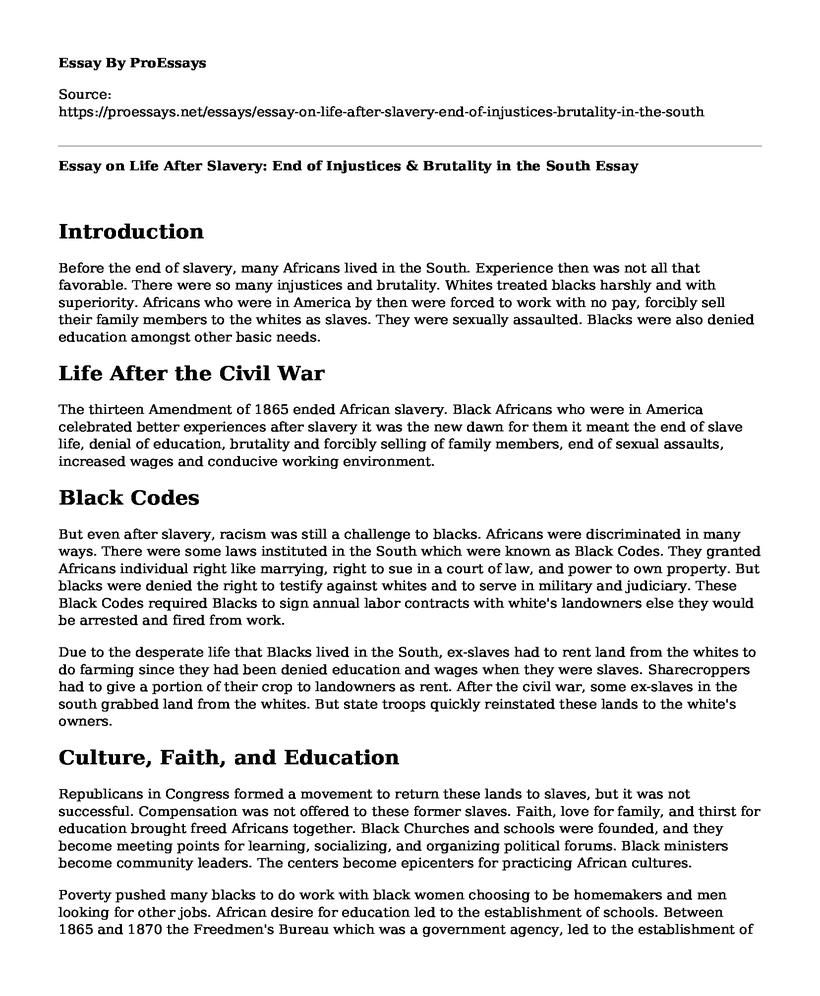Introduction
Before the end of slavery, many Africans lived in the South. Experience then was not all that favorable. There were so many injustices and brutality. Whites treated blacks harshly and with superiority. Africans who were in America by then were forced to work with no pay, forcibly sell their family members to the whites as slaves. They were sexually assaulted. Blacks were also denied education amongst other basic needs.
Life After the Civil War
The thirteen Amendment of 1865 ended African slavery. Black Africans who were in America celebrated better experiences after slavery it was the new dawn for them it meant the end of slave life, denial of education, brutality and forcibly selling of family members, end of sexual assaults, increased wages and conducive working environment.
Black Codes
But even after slavery, racism was still a challenge to blacks. Africans were discriminated in many ways. There were some laws instituted in the South which were known as Black Codes. They granted Africans individual right like marrying, right to sue in a court of law, and power to own property. But blacks were denied the right to testify against whites and to serve in military and judiciary. These Black Codes required Blacks to sign annual labor contracts with white's landowners else they would be arrested and fired from work.
Due to the desperate life that Blacks lived in the South, ex-slaves had to rent land from the whites to do farming since they had been denied education and wages when they were slaves. Sharecroppers had to give a portion of their crop to landowners as rent. After the civil war, some ex-slaves in the south grabbed land from the whites. But state troops quickly reinstated these lands to the white's owners.
Culture, Faith, and Education
Republicans in Congress formed a movement to return these lands to slaves, but it was not successful. Compensation was not offered to these former slaves. Faith, love for family, and thirst for education brought freed Africans together. Black Churches and schools were founded, and they become meeting points for learning, socializing, and organizing political forums. Black ministers become community leaders. The centers become epicenters for practicing African cultures.
Poverty pushed many blacks to do work with black women choosing to be homemakers and men looking for other jobs. African desire for education led to the establishment of schools. Between 1865 and 1870 the Freedmen's Bureau which was a government agency, led to the establishment of the first Black college Howard University and Fisk University.
Reconstruction
The period of construction lasted between 1865 to 1877. During this period, Congress movement enforced laws that would promote civil and political rights for blacks living in the South. Blacks actively enjoyed the rights and opportunities granted. They took the responsibilities of citizens. In this time of reconstruction 700 Blacks served in the elected post in public offices. Black leaders living in the South were terrorized in the 1860s by Ku Klux Klan (KKK). The US Congress in 1871 passed laws that led to the imprisonment of Klan leaders. By late 1860s the federal military was withdrawn from various southern states. Its withdrawal of federal troops was ordered in 1877 by president Rutherford B. Hayes. Reconstruction came to an end since there were no troops to enforce Fourteenth and Fifteen Amendments. After the second world war in 1960 when civil rights movements were outlawed. In this period of reconstruction, around two thousand Black Americans held government Jobs.
Cite this page
Essay on Life After Slavery: End of Injustices & Brutality in the South. (2023, Jan 18). Retrieved from https://proessays.net/essays/essay-on-life-after-slavery-end-of-injustices-brutality-in-the-south
If you are the original author of this essay and no longer wish to have it published on the ProEssays website, please click below to request its removal:
- Israel and Palestine Conflict
- Compare and Contrast Essay on the Declaration of Independence and the Declaration of Rights and Sentiments
- Essay Sample on Greek Health Beliefs
- Essay Example on the Cold War: A Conflict Between Two Superpowers
- US Superpower: Global Influence & Control - Essay Sample
- Essay Example on Tata Steel: A Visionary's Journey of Nationalism & Industrial Revolution
- Report Sample on Arab Israeli Palestinian Conflict







